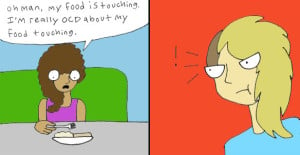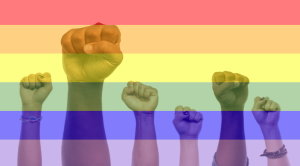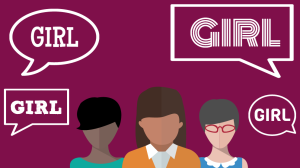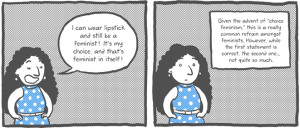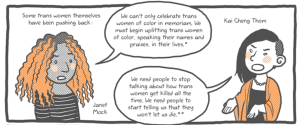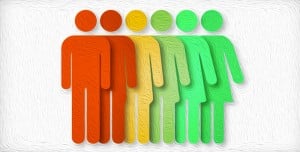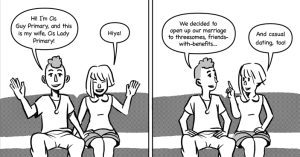
Two people of different sizes wear the same outfit, facing each other. Source: Prairie Path
Author’s Note: This piece is not in defense of skinny-shaming. Body-shaming in all forms is inexcusable. Rather, this piece aims to point out the ways in which fat-shaming entails an extra layer of oppression – fatphobia – that skinny-shaming lacks.
I have a very complicated relationship with the concept of skinny-shaming.
I’m a body image activist who attempts to work in solidarity with the fat acceptance movement, an eating disorder survivor who still harbors body and food issues, and a person of average size who talks openly about thin privilege.
Of course I have a complicated relationship with skinny-shaming.
But something that I see coming up a lot is the idea that skinny-shaming (making rude or snide remarks about thin bodies) is “reverse discrimination.”
Some say that if we want to curb body-hate, we can’t participate in body-hate.
That, I’m into.
But then there are the people who say that “skinny-shaming is the same as fat-shaming” – which simply isn’t true.
And because on the surface, that comparison seems to hold water, I think we need to examine it a little more closely to see why – when using an intersectional, anti-oppression lens – it’s a false equivalence.
1. Yes, Skinny-Shaming Sucks
I want to be honest about the fact that the concept of “thin-shaming” or “skinny-shaming” is a difficult one to talk about. People who have experienced the pain of being made to feel ashamed of their bodies want to be validated and acknowledged for that – and they should be.
No one should feel like their body isn’t “good enough.”
(Side note: Your body is good enough.)
And while there are problems with the body-positive movement, something that it tries to stand for is assuring people that all bodies are deserving of love and care.
If we want to be body-positive, then we need celebrate all bodies and understand that all people are made to feel like shit about their appearance. That’s simply how patriarchal capitalism (a la the fashion and dieting industries) works.
I would never argue that skinny-shaming is any shade of acceptable.
It isn’t.
Not only is it plain mean, but as social justice activists, we also should be clear that body-shaming is a tool of oppression.
Here, I talk about how because skinny-shaming is rooted in sexism – that regardless of our body types, society polices them because patriarchal structures benefit from the creation of this insecurity – it is, indeed, oppressive.
Keeping women focused heavily on their appearances has been, in the words of Naomi Wolf, “the most potent political sedative in women’s history.”
And when we body-shame anyone, we’re contributing to that violence.
But I also want to make the point that it’s necessary to take an intersectional approach to feminist thought, including in discussions of body shame.
And that is where the differences between skinny- and fat-shaming come to light.
2. Intersectionality Matters
Let’s talk about the concept of “good hair.”
If you’ve never heard of this (or have never seen Chris Rock’s documentary), it’s essentially an idea within communities of color (especially among Black women) that the closer one’s hair is to European texture (that is, straight and smooth), the “better” it is.
Clearly, we can see how this is sexist: Telling women that their hair needs to look a certain way in order to be beautiful – and that they need to spend an inordinate amount of time and money on it to make it do something that it isn’t naturally inclined to do – is a problem.
But if we want to deconstruct and examine this beauty standard, we need to address that it’s also Eurocentric in nature – that it places European (read: white) features as the ideal.
It’s not just sexist. It’s also racist.
And that intersection matters.
Now, that doesn’t mean that only women of color have hair issues.
I grew up a curly girl in the 1990s when straight-straight hair reigned supreme. And I still remember my disappointment when, at 12, I asked my stylist to please give me, as I pointed in a magazine to The Rachel, “this cut,” and was told, “There is no way your hair is ever going to look like that.”
Ouch.
That was the first time that I understood that my hair wasn’t “perfect” – that there were standards that I would never live up to. That hurt.
But while that early instance of sexist beauty standards hurt me, I didn’t experience racism on top of it.
That one stylist broke my heart. That one shattered dream of never looking like Jennifer Aniston sucked. That one haircut was a disappointment.
But the rest of the world as a whole didn’t shun me because of my hair.
Fat- and skinny-shaming kind of work in the same way.
When we talk about skinny- and fat-shaming, the difference is that while the former may be tied to sexism, fat-shaming exists at the intersection of sexism and fatphobia.
They’re both terrible and oppressive. But only one is the result of multiple oppressions.
Take, for instance, if I was at the beach with a fat counterpart, and we were both eating ice cream.
I might be calculating calories. I might be thinking that I should’ve gotten the frozen yogurt instead. I might be having a terrible body image day and feeling awful about myself.
But no one on the beach is even giving me a second look. And even if someone does, it’s still not pervasive.
My fat friend, though? People might be passing her, looking disgusted. They might be giving her unsolicited diet advice. They might even openly comment on what she’s eating.
The sexist standards plaguing my mind are awful – but the rest of the world isn’t shunning me because of my body.
The intersection of fatphobia and sexism matters, and we can’t discuss the problem of fat-shaming without acknowledging that fatphobia adds an additional layer of oppression.
3. Power and Privilege Play a Role
When we talk about fatphobia, we’re talking about the idea that we live in a thin-centric world that demonizes fat bodies, that the very structures that hold up our society prioritize the comfort and safety of thin bodies.
This is what that looks like:
As I’ve discussed before, I’ve never been asked to pay more for a seat on an airplane – because the seats were designed with my body type in mind.
I’ve never experienced a doctor dismissing my health concerns by telling me that if I just “lose weight,” all of my problems will be solved – because the institution of Western Medicine doesn’t look at my body inherently as a problem that needs to be fixed.
I can walk into a clothing store and (most likely) find items in my size – because I’m considered “standard.”
Fat folk? They don’t have the same experiences that I do – because fatphobia (which dictates the fear, disgust, and hatred that the public feels toward fat bodies) exists.
This reminds me of the thousands of conversations I’ve had to have in my life with people who swear that “reverse racism” is a thing – that stereotyping, prejudice, or discrimination of white people is “racist.”
It’s not.
It’s not okay, but it isn’t oppressive. You can’t oppress the people who have social power. That’s not how it works.
Similarly, the reason why skinny-shaming doesn’t exist as equally oppressive as fat-shaming is because there is no additional power behind it.
It’s important to understand that even if individuals shame you, respect (and even admiration!) for you is still woven into the fabric of our society.
Denouncing fat women is just reinforcing the same intersection of oppressive structures that people of size deal with day in and day out – and there is no escape from that.
4. Sometimes What You Call ‘Skinny-Shaming’ Isn’t Skinny-Shaming
Let’s discuss the difference between equality and justice.
When we talk about valuing “equality,” generally what we’re saying is that we want everyone in society to be treated the same – namely, well.
And that’s great.
But there’s no magic wand – no, not even feminism – that’s going to make that happen overnight. Working toward a more egalitarian society is a process.
And the process of administering this equality – in doing the hard work and consciousness raising that hopefully will make equality a reality someday – is the pursuit of justice.
And sometimes, justice looks unfair.
Sometimes it looks like people are getting special treatment. But because they wouldn’t need that special treatment if equality existed, what it really is, is a leveling out of the playing field.
Take Meghan Trainor’s summer jam “All About That Bass” as an example (putting aside the arguments that it’s anti-feminist in its approach just for the sake of this article, although it’s disconcerting).
I’ve heard people saying that while they’re glad that the song celebrates bodies that “ain’t no size two,” the fact that the lyrics center around “bringing booty back” are problematic – just because they don’t address the “All Bodies Are Beautiful” mantra.
The argument is that anything that purports fat bodies as worthy of love are inherently skinny-shaming because they don’t include skinny women or because they posit thick bodies as somehow “better than” thin ones.
But here’s the thing: Because disenfranchised groups – in this case, I’m talking about groups who have systematically been left out of consideration in the definition of “beauty” – need to be empowered and lifted up to even get to the level that privileged people are.
That’s like if someone uses the hashtag #BlackLivesMatter and someone responds with “All lives matter!”
No shit.
Of course all lives matter. Of course all bodies are deserving of love and praise.
But only some lives – and only some bodies – are given that privilege as a birthright. Everyone else has to be louder in order to get even close to that status.
If we were all equal – if all bodies experienced body-shaming (and even body appreciation!) in the same way – then the argument would hold water. But we’re not, so we don’t, so it doesn’t.
Something can be body-positive and at the same time, leave thin bodies out of the conversation. Because eradicating oppression sometimes means decentering the conversation from around the oppressor.
***
If we want to work together in a movement to end body-shaming, we all need to be on board with the idea that no one should ever be made to feel bad about their bodies.
But I also think that if we want to stand in solidarity with fat acceptance, we need to critically analyze the ways in which skinny- and fat-shaming differ.
Because if we’re not prepared to do that hard thinking and work through our own privileges, then we’re not doing the movement any favors either.
[do_widget id=’text-101′]
Melissa A. Fabello, Managing Editor of Everyday Feminism, is a body acceptance activist and sexuality scholar living in Philadelphia. She enjoys rainy days, tattoos, yin yoga, and Jurassic Park. She holds a B.S. in English Education from Boston University and an M.Ed. in Human Sexuality from Widener University. She is currently working on her PhD. She can be reached on Twitter @fyeahmfabello.
Search our 3000+ articles!
Read our articles about:
Our online racial justice training
Used by hundreds of universities, non-profits, and businesses.
Click to learn more







